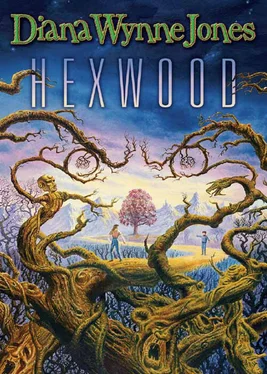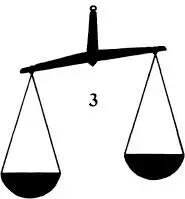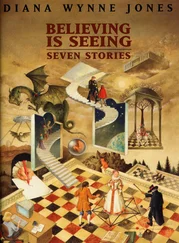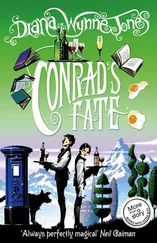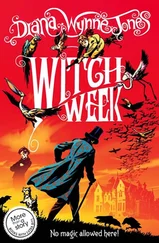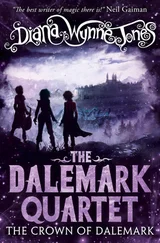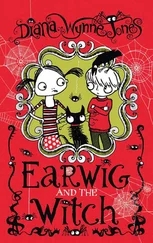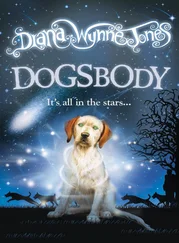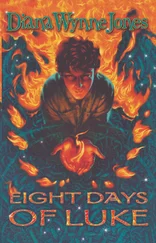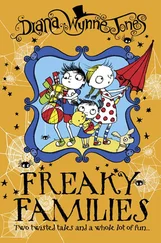“What are you?” he asked.
“I am Yam,” said the being, “one of the early Yamaha robots, series nine, which were the best that were ever made.” It added, with pride in its flat voice, “I am worth a great deal.” Then it paused, and said, “If you do not know that, what else do you not know?”
“I don’t know anything,” said the boy. “What am I?”
“You are Hume,” said Yam. “That is short for human , which you are.”
“Oh,” said the boy. He discovered, by moving slightly, that he could see himself reflected in the robots shining front. He had fairish hair, grown longish, and he seemed to stand and move in a light, eager sort of way. The purple-blue clothes clung close to his skinny body from neck to ankles, without any sort of markings, and he had a pocket in each sleeve. Hume, he thought. He was not certain that was his name. And he hoped the shape of his face was caused by the robots curved front. Or did people’s cheekbones really stick out that way?
He looked up at Yam’s silver face. The robot was nearly two feet taller than he was. “How do you know?”
“I have a revolutionary brain and my memory is not yet full,” Yam answered. “This is why they stopped making my series. We lasted too long.”
“Yes, but,” said the boy – Hume, as he supposed he was, “I meant—”
“We must get out of this piece of wood,” said Yam. “If the reptile is alive, we have come to the wrong time and we must try again.”
Hume thought that was a good idea. He did not want to be anywhere near that scaly thing with the mouth. Yam swivelled himself around on the spot and began to stride back along the path. Hume trotted to keep up. “What have we got to try?” he asked.
“Another path,” said Yam.
“And why are we together?” Hume asked, trying again to understand. “Do we know one another? Do I belong to you or something?”
“Strictly speaking, robots are owned by humans,” Yam said. “These are hard questions to answer. You never paid for me, but I am not programmed to leave you alone. My understanding is that you need help.”
Hume trotted past a whole thicket of the airy pink blossoms, which reflected giddily all over Yam’s body. He tried again. “We know one another? You’ve met me before?”
“Many times,” said Yam.
This was encouraging. Even more encouraging, the path forked beyond the pink trees. Yam stopped with a suddenness that made Hume overshoot. He looked back to see Yam pointing a silver finger down the left fork. “This wood,” Yam told him, “is like human memory. It does not need to take events in their correct order. Do you wish to go to an earlier time and start from there?”
“Would I understand more if I did?” Hume asked.
“You might,” said Yam. “Both of us might.”
“Then it’s worth a try,” Hume agreed.
They went together down the left-hand fork.
Hexwood Farm housing estate had one row of shops, all on the same side of Wood Street, and Ann’s parents kept the greengrocer’s halfway down the row. Above the houses on the other side you could see the trees of Banners Wood. And at the end of this row were the tall stone walls and the ancient peeling gate of Hexwood Farm itself. All you could see of the farmhouse was one crumbling chimney that never smoked. It was hard to believe that anybody lived there, but in fact old Mr Craddock had lived there until a few months ago for as long as Ann could remember, keeping himself to himself, and snarling at any child who tried to get close enough to see what was inside the old black gate. “Set the dogs on you!” he used to say. “Set the dogs to bite your leg off!”
There were no dogs, but nobody dared pry into the farm all the same. There was something about the place.
Then, quite suddenly, Mr Craddock was not there and a young man was living there instead. This one called himself Harrison Scudamore and dyed the top of his hair orange. He stalked about with a well-filled wallet bulging the back of his jeans and behaved, as Ann’s dad said, as if he was a cut above the Lord Almighty. This was after young Harrison had stalked into the shop for half a pound of tomatoes and Dad had asked politely if Mr Scudamore was lodging with Mr Craddock.
“None of your business,” young Harrison said. He more or less threw the money at Dad and stalked out of the shop. But he turned in the doorway to add, “Craddock’s retired. I’m in charge now. You’d all better watch it.”
“Awful eyes he has,” Dad remarked, telling Anne and Martin the tale. “Like gooseberries.”
“A snail,” Mum said. “He made me think of a snail.”
Ann lay in bed and thought of young Harrison. She had one of those viruses that was puzzling the doctor, and there was not much to do except lie and think of something . Every so often, she got up out of sheer boredom. Once, she even went back to school. But it always ended with Ann grey and shaky and aching all over, tottering back to bed. And when her brother Martin had been to the library for her, and she had read all her own books, and then Martins – Martin’s were always either about dinosaurs or based on role-playing games – she had no energy to do anything but lie and think. Harrison was at least a new thing to think about. Everybody hated him. He had been rude to Mr Porter the butcher too. And he had told Mrs Price, who kept the newsagent’s at the end, to shut up and stop yakking on. “And I was only talking – politely, you know – the way I do with everyone,” Mrs Price said, almost tearfully. Harrison had kicked the pampered little dog that belonged to the boys who kept the wine shop, and one of them had cried. Everyone had some tale to tell.
Ann wondered why Harrison behaved like that From a project she dimly remembered doing at school, she knew the whole estate had once been lands belonging to Hexwood Farm. The farm stretched north as far as the chemical works and east beyond the motel. Banners Wood, in the middle, had once been huge, though it was hardly even a wood these days. You could see through it to the houses on the other side. It was just trees round a small muddy stream, and all the children played there. Ann knew every crisp packet under every tree root and almost every Coke ring embedded in its muddy paths.
But perhaps Harrison has inherited the farm and thinks he still owns it all, she thought. He did behave that way.
In fact, Ann’s real theory was quite different and much more interesting. That old farm was so secretive and yet so easy to get to from London that she was convinced it was really a hideout for gangsters. She was sure there was gold bullion or sacks and sacks of drugs – or both – stored in its cellar with young Harrison to guard it. Harrison’s airs were because the drug barons paid him so much to guard their secrets.
What do you think about that? she asked her four imaginary people.
The Slave, as so often, was faint and far off. His masters overworked him terribly. He thought the theory very likely. Young Harrison was a menial giving himself airs – he knew the type.
The Prisoner considered. If Ann was right, he said, then young Harrison was behaving very stupidly, drawing attention to himself like this. Her first theory was better.
But I only thought of that to be fair-minded! Ann protested. What do you think, King?
Either could be right , said the King. Or both .
The Boy, when Ann consulted him, chose the gangster theory, because it was the most exciting.
Читать дальше
